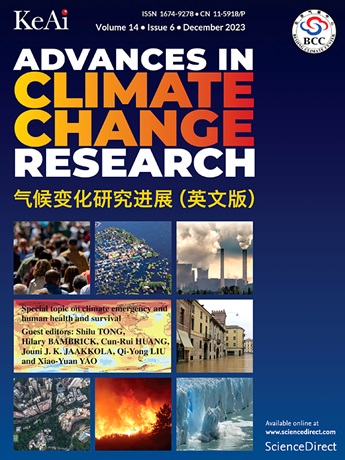Global glacier albedo trends over 2000–2022: Drivers and implications
IF 5.2
1区 地球科学
Q1 ENVIRONMENTAL SCIENCES
引用次数: 0
Abstract
Despite the accelerated loss of global glacier mass in the 21st century, the dynamics governing glacier albedo and its role in this decline are not fully understood. Addressing this knowledge gap, this study investigates global glacier albedo trends, a critical but overlooked factor in the context of climate change. this investigation utilized the Randolph Glacier Inventory v7.0, Moderate Resolution Imaging Spectroradiometer (MODIS) imagery, and ERA5-Land reanalysis data to decode the trends and drivers of glacier albedo from 2000 to 2022 on a global scale. We reported a general global albedo decline of 0.06% ± 0.04% (at 95% confidence level) per annum with regional deviations, predominantly driven by increases in surface air temperature across most regions, challenging the conclusions of earlier regional studies. Notably, in the Low Latitudes and South Asia East (SAE), as well as Antarctic and Subantarctic (AS) regions, aerosols (31% for SAE and 37% for AS) emerged as significant albedo influencers. Other factors, such as snowline migration, debris cover, glacier algae growth, and dust accumulation, are also known to influence glacier albedo but were not explicitly modeled in this study. These findings underscore the criticality of bespoke climate adaptation strategies, particularly addressing aerosol impacts, and reinforce the urgent need for a cohesive, global approach to glacier darkening and melt mitigation and protection.
2000-2022年全球冰川反照率趋势:驱动因素和影响
尽管21世纪全球冰川质量的减少加速,但控制冰川反照率的动力学及其在这种减少中的作用尚未完全了解。为了解决这一知识差距,本研究调查了全球冰川反照率趋势,这是气候变化背景下一个关键但被忽视的因素。本研究利用Randolph Glacier Inventory v7.0、MODIS图像和ERA5-Land再分析数据,对2000 - 2022年全球冰川反照率的变化趋势和驱动因素进行了解码。我们报告的全球反照率总体下降幅度为每年0.06%±0.04%(95%置信水平),存在区域偏差,主要是由于大多数地区地表气温的升高,这对早期区域研究的结论提出了挑战。值得注意的是,在低纬度地区和南亚东部(SAE)以及南极和亚南极(as)地区,气溶胶(SAE占31%,as占37%)成为重要的反照率影响因素。其他因素,如雪线迁移、碎屑覆盖、冰川藻类生长和粉尘积累,也已知会影响冰川反照率,但本研究没有明确模拟。这些发现强调了定制的气候适应战略的重要性,特别是针对气溶胶影响的战略,并强调迫切需要采取一种凝聚力的全球方法来应对冰川变黑和减缓和保护冰川融化。
本文章由计算机程序翻译,如有差异,请以英文原文为准。
求助全文
约1分钟内获得全文
求助全文
来源期刊

Advances in Climate Change Research
Earth and Planetary Sciences-Atmospheric Science
CiteScore
9.80
自引率
4.10%
发文量
424
审稿时长
107 days
期刊介绍:
Advances in Climate Change Research publishes scientific research and analyses on climate change and the interactions of climate change with society. This journal encompasses basic science and economic, social, and policy research, including studies on mitigation and adaptation to climate change.
Advances in Climate Change Research attempts to promote research in climate change and provide an impetus for the application of research achievements in numerous aspects, such as socioeconomic sustainable development, responses to the adaptation and mitigation of climate change, diplomatic negotiations of climate and environment policies, and the protection and exploitation of natural resources.
 求助内容:
求助内容: 应助结果提醒方式:
应助结果提醒方式:


